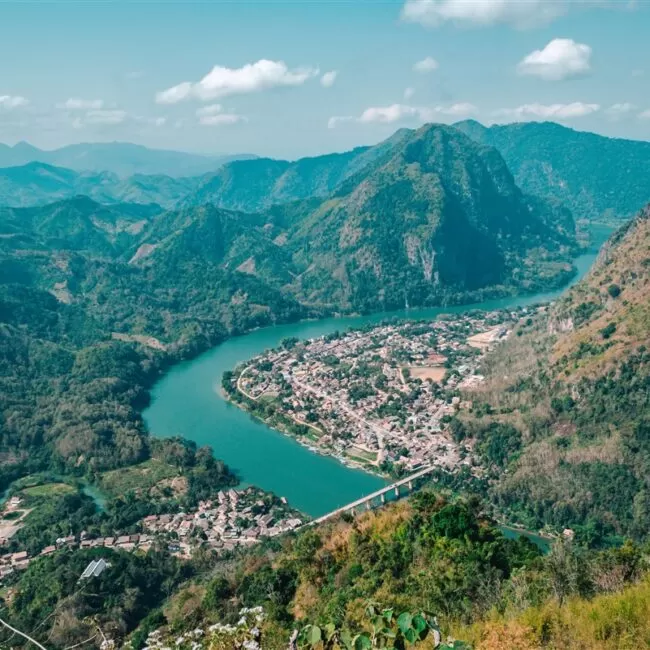

While most people tend to flock to Athens, the capital city of Greece, visiting the second-largest city in the country might be a good alternative. But, is Thessaloniki worth visiting? In this post, I will let you in on everything you need to know about Thessaloniki and why this might be your next bucket list destination!
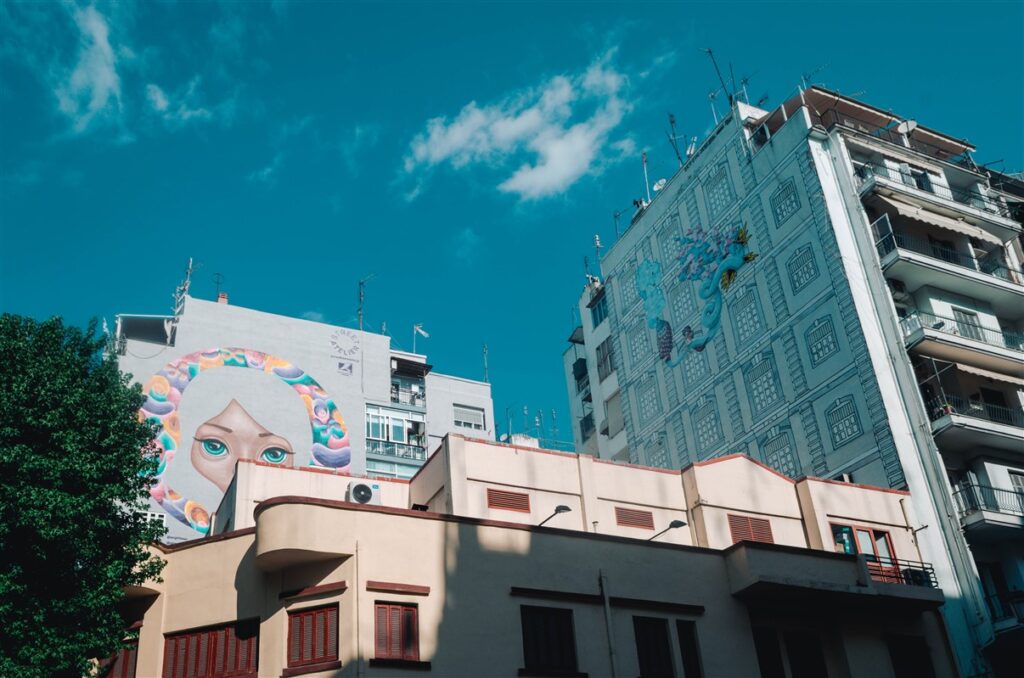
Famous grafitti in Thessaloniki
Thessaloniki is Greece’s second-largest city and offers a captivating blend of history, culture, and modernity. Located along the blue waters of the Thermaic Gulf, this under-the-radar city boasts a rich past of influences, dating back over 2300 years. Once a bustling hub of the Byzantine Empire, Thessaloniki’s historical legacy is still evident in its well-preserved archaeological sites, such as the White Tower and the Rotunda.
Today, Thessaloniki is a vibrant metropolis showcasing a great mix of its past with a dynamic present. Its lively streets are stacked with a plethora of cafes, funky bars, and quirky restaurants, where both locals and travelers can savor delicious Greek cuisine and enjoy coffee sipping on hidden terraces in cozy corners of the city.
But, is Thessaloniki worth visiting compared to the capital of Athens or the Greek islands? In the next section, we’ll get into the various reasons why Thessaloniki is absolutely worth visiting and makes for a great alternative to Athens!
Thessaloniki, Greece’s second-largest city, is a vibrant and culturally rich destination with a lot to offer. Here are 12 compelling reasons to visit Thessaloniki:
Thessaloniki boasts a long and storied history, with roots dating back to ancient times. It was founded in 315 BC by Cassander and named after his wife Thessalonike, the half-sister of Alexander the Great.
Throughout its history, Thessaloniki has been a cultural crossroads where various civilizations and cultures met and influenced one another, including Roman, Byzantine, Ottoman, Jewish, and more. This multicultural heritage is still visible to this day in the city’s architecture, cuisine, and traditions.
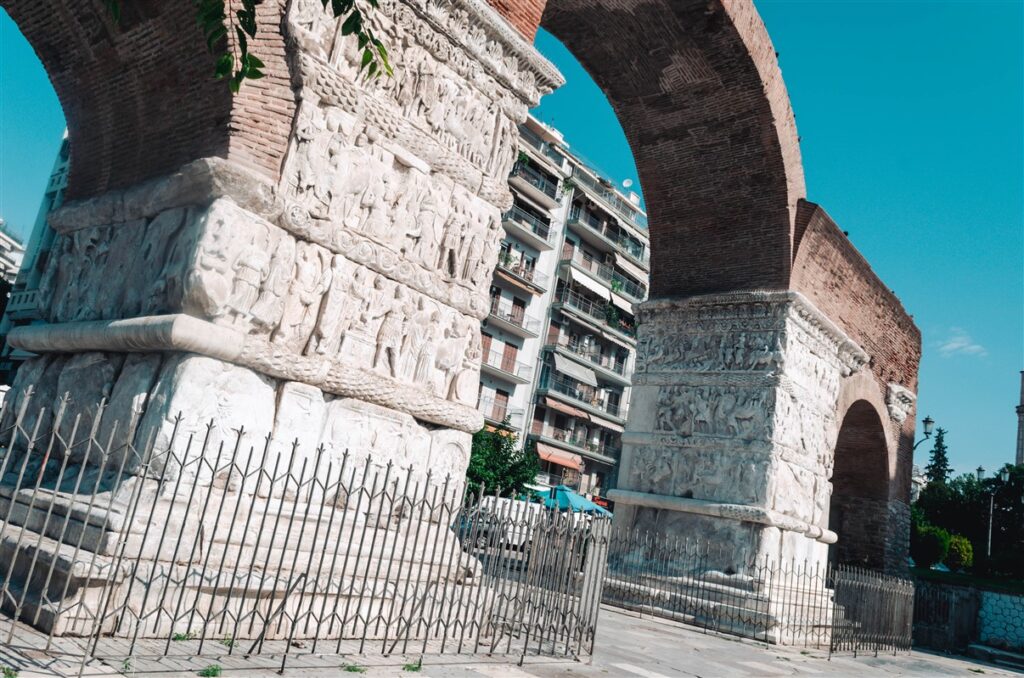
The Arch of Galerius
Thessaloniki is home to several well-preserved Roman monuments, which showcase its historical significance during the Roman period. Some of the notable Roman monuments in Thessaloniki include:
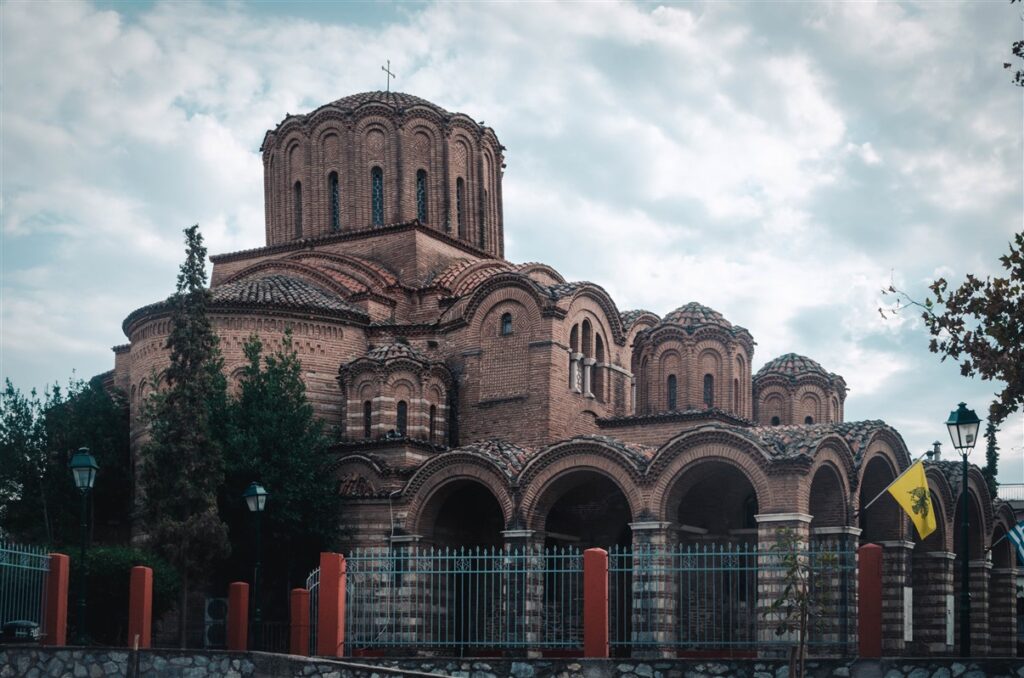
Church of Panagia Chalkeon, Thessaloniki, Greece
History buffs can explore the Byzantine heritage of Thessaloniki by visiting various sites, churches, and museums throughout the city. Thessaloniki has a rich Byzantine history, and here are some ways to immerse yourself in its Byzantine heritage:
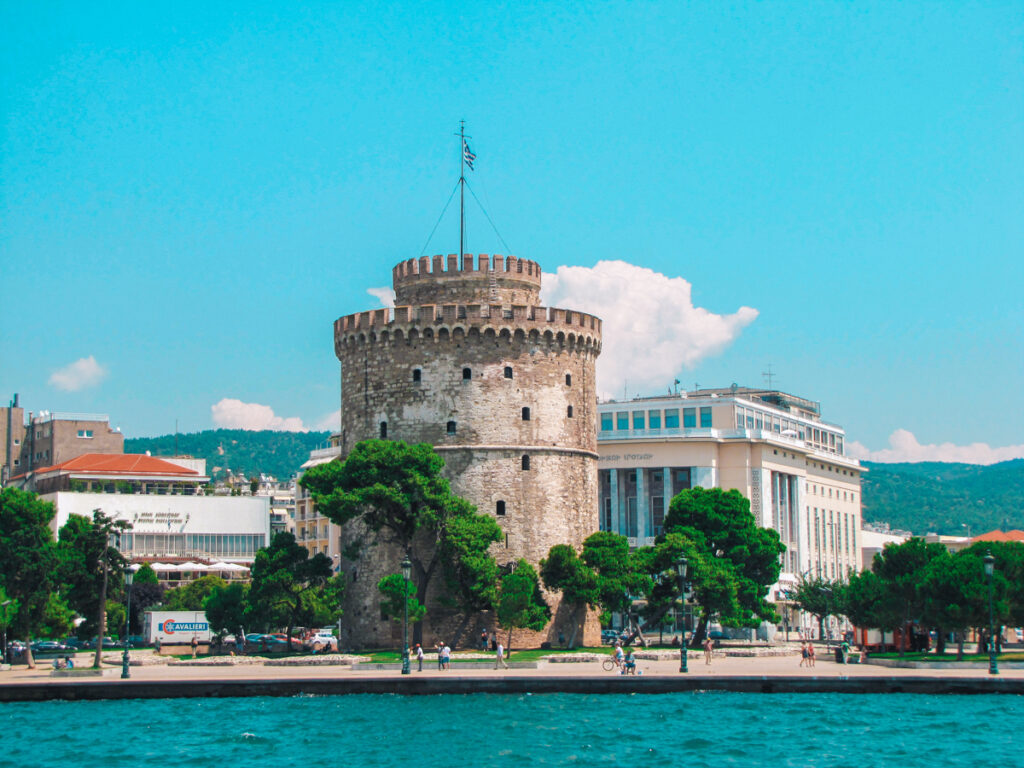
The White Tower in Thessaloniki
The White Tower is an architectural jewel standing on Thessaloniki’s waterfront. Built in the 15th century during Ottoman rule, it was originally named the “Tower of Blood” due to its role as a prison and execution site.
Culturally, the White Tower is intertwined with Thessaloniki’s identity, as it stands as a symbol of the city’s resilience through centuries of change. Today, it houses a museum that exhibits the city’s history.
Accessible to all, a climb up the White Tower’s spiral staircase will reward you with breathtaking views of Thessaloniki and the tranquil Thermaic Gulf. Its waterfront location makes it a great starting point for leisurely walks along the cozy promenade.
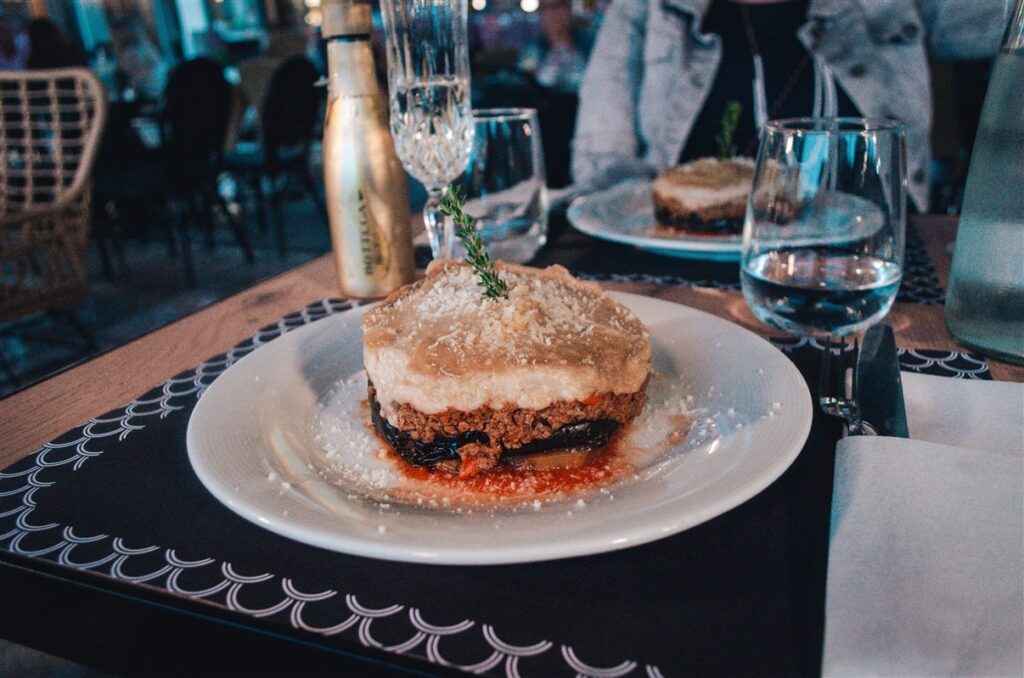
Vegan Moussaka in Thessaloniki
Thessaloniki has a rich culinary scene and you can find a lot of local delicacies here like Bougatsa, Koulouri Thessalonikis and Soutzouk Loukoum.
Bougatsa is an iconic pastry and a breakfast favorite among locals in Thessaloniki. It consists of thin layers of dough filled with sweet custard and then baked until golden and dusted with powdered sugar.
Koulouri Thessalonikis is a popular street food. Koulouri are sesame-crusted bread rings that are perfect for a quick snack or breakfast. They’re often enjoyed with coffee or a glass of fresh juice. You can see them everywhere on the streets of Thessaloniki.
Soutzouk Loukoum is a delicious pastry that originated in Northern Greece. It is a sausage-shaped sweet with walnuts and powdered sugar.
Aside from local Greek dishes, you can also find many great restaurants in Thessaloniki that cater to vegans.
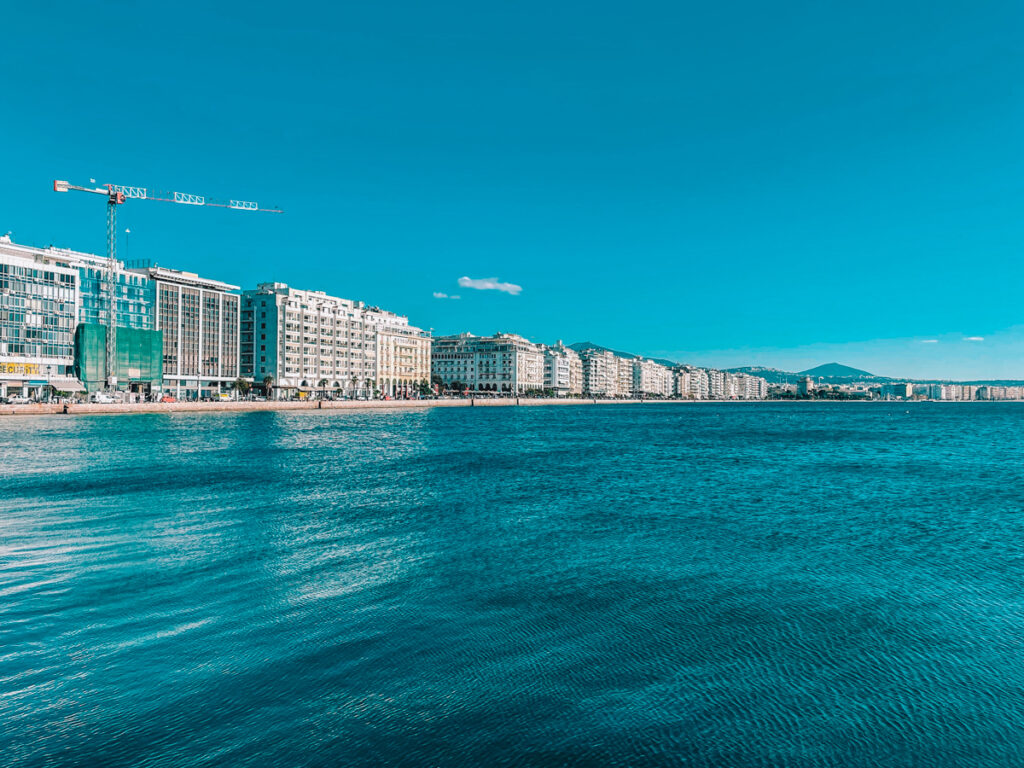
The waterfront of Thessaloniki is 5 kilometers long and is one of the best places to hang out in the evening, starting with a leisurely stroll at the White Tower.
also called Nikis Avenue, you can enjoy wonderful sunsets here while enjoying a drink on one of the many terraces. Do note that the prices here can be inflated compared to other establishments in the city due to its scenic location.
The wide, pedestrian-friendly promenade is perfect for leisurely strolls, jogging, or cycling. You can rent bicycles from various points along the waterfront to explore the area.
Thessaloniki is home to several archaeological museums that showcase the city’s rich history and heritage. These museums house an impressive array of artifacts from various periods, including ancient Greece, the Roman era, and the Byzantine period. Here are the main archaeological museums in Thessaloniki:
These archaeological museums provide a comprehensive look at the history and cultural heritage of Thessaloniki and its surroundings, making them must-visit destinations for history enthusiasts and anyone interested in the city’s rich past.
Thessaloniki is a student town and is known for its vibrant and diverse nightlife scene, offering a wide range of entertainment options for both locals and travelers.
Ladadika is one of the most popular areas in Thessaloniki to visit for clubbing, with small cobblestone alleyways where you can walk from one lively bar to the next club.
People who prefer to keep it a bit more traditional can check out a Bouzoukia club. These clubs are a quintessential Greek nightlife experience. They feature live music performances, often with traditional Greek instruments like the bouzouki. As a traveler, you can enjoy music, dance, and a lively atmosphere while savoring Greek cuisine and drinks.
For late-night dining in a local setting, go to the Ana Poli neighborhood which seems like a world away from the hustle and bustle of the city center.
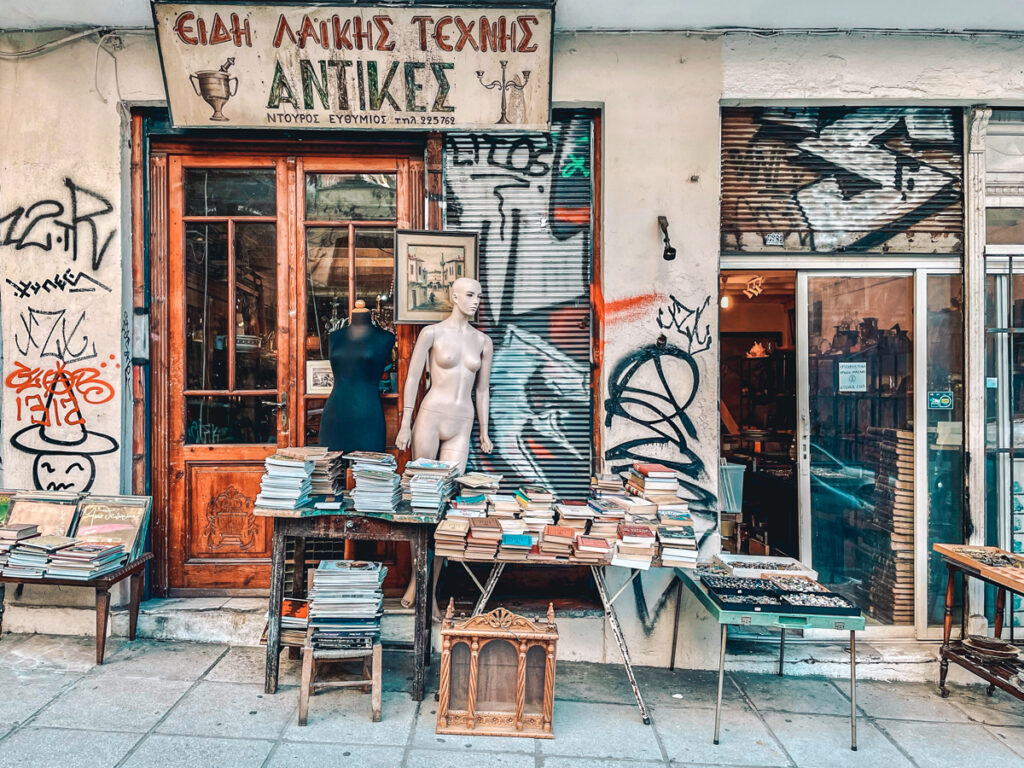
Antique shop in Thessaloniki, Greece
Thessaloniki offers a diverse shopping experience, from modern malls to bustling markets and boutique-lined streets. Here are some of the best places for shopping in Thessaloniki:
Thessaloniki hosts a variety of festivals and events throughout the year, celebrating everything from arts and culture to food and music. Here are some of the most notable festivals and events held in Thessaloniki:
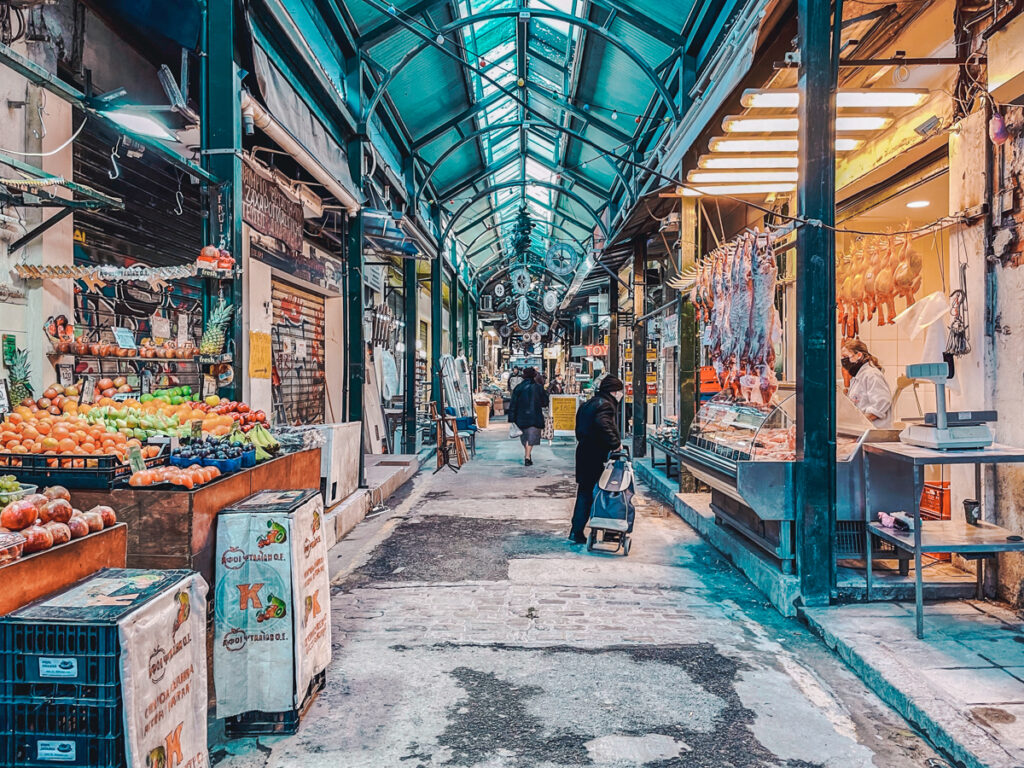
Kapani market, Thessaloniki, Greece
Thessaloniki is known for having great markets where you can experience the local culture, sample delicious food, and shop for unique products. Here are some local markets in Thessaloniki that are worth visiting:
Thessaloniki is a great starting point for exploring the diverse and historically rich region of Macedonia in northern Greece. Here are some cool day trips you can take from Thessaloniki:

Perea beach near Thessaloniki, Greece
While Thessaloniki is a wonderful city with a rich history, vibrant culture, and many attractions, it’s not primarily known for its beaches. The city does have a waterfront along the Thermaic Gulf, and there are areas where you can enjoy the sea, but Thessaloniki is not considered a traditional beach destination like some of the Greek islands or coastal towns. Here are some points to consider if you’re interested in beaches:
Thessaloniki, compared to some other European cities, is generally considered to be more affordable. However, like any city, the cost of living in Thessaloniki can vary depending on your lifestyle and choices.
Local wines for example will only cost a few Euros for one liter while fancy cocktails will cost much more. Same as for dining out, going to a local taverna will be much cheaper than dining out in an upscale restaurant.
Overall, you can say that Thessaloniki offers good value for money compared to many Western European cities. However, costs can vary, so it’s essential to budget according to your preferences and lifestyle. Many travelers find Thessaloniki to be a reasonably priced destination while still offering a high quality of life and rich cultural experiences.

Sailing boats at the waterfront Thessaloniki, Greece
Thessaloniki is generally considered a safe city for travelers. Greece, in general, has a reputation for being a safe destination for tourists. However, as with any city or travel destination, it’s essential to be aware of your surroundings and take standard safety precautions.
Here is a full guide about whether Thessaloniki is a safe city to visit.
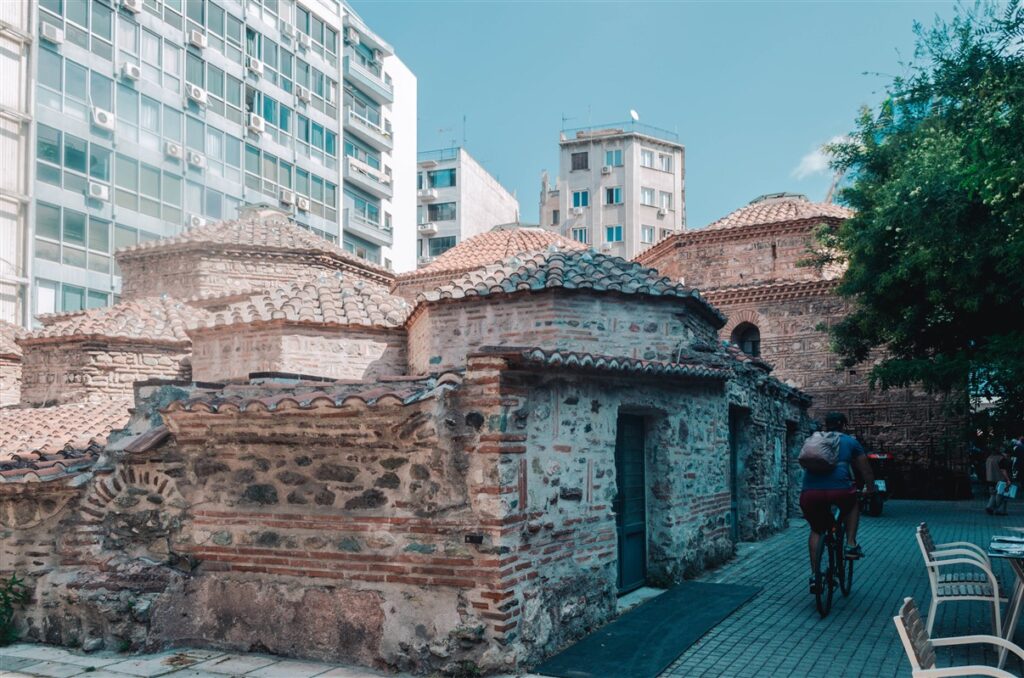
Turkish bathing houses in Thessaloniki, Greece
The ideal duration of your stay in Thessaloniki depends on your interests and how much you want to explore the city and its surroundings.
I wouldn’t recommend staying in Thessaloniki for less than 2 days. You wouldn’t be able to grasp the true spirit of the city and visit all the important sites.
Allow at least three to four days of exploration if you want to take in all the cultural and historical sights. This gives you time to visit museums, explore Byzantine heritage sites, and enjoy local cuisine.
If you want to relax, explore at a leisurely pace, and take day trips to nearby destinations like Mount Olympus or Halkidiki’s beaches, plan for five to seven days. This provides a well-rounded experience of the city and its surroundings.
If you are a slow traveler like me, for a comprehensive exploration of Thessaloniki, its history, and its surroundings, or if you’re combining your visit with more extensive travel in northern Greece, consider staying over a week.
Thessaloniki is a well-connected city in Greece, and there are several ways for tourists to reach the city, depending on their location and preferences. Here are some common methods of reaching Thessaloniki as a tourist:
Once you arrive in Thessaloniki, the city offers a well-connected public transportation system, including buses and taxis, making it easy to navigate and explore the city and its surroundings.
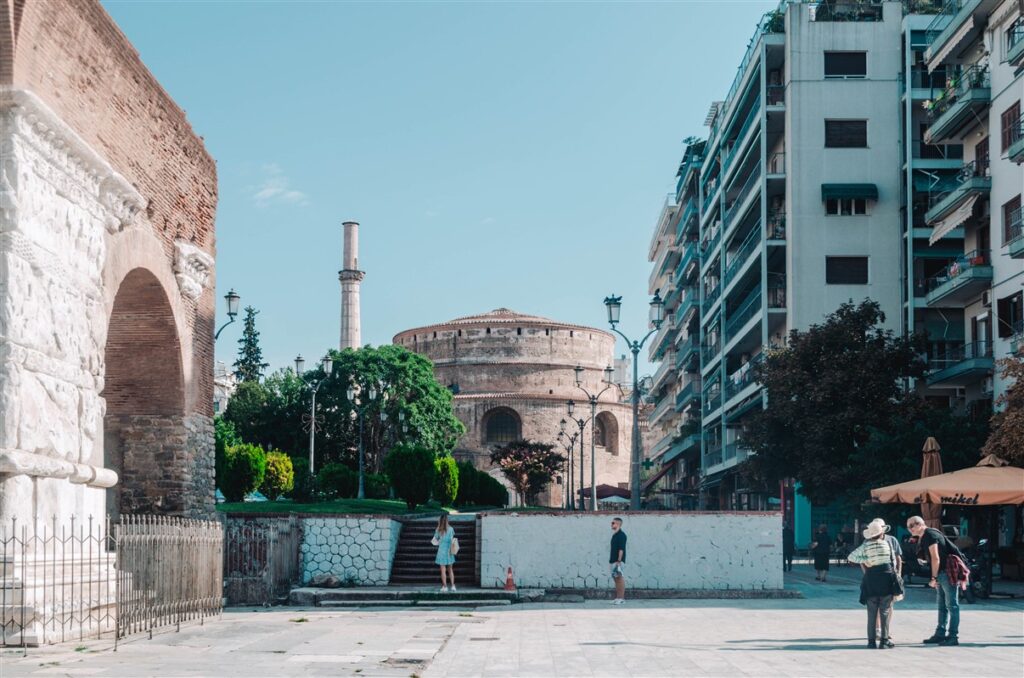
Rotunda, Thessaloniki, Greece
Thessaloniki offers a variety of accommodation options to suit different preferences and budgets. The best place to stay in Thessaloniki largely depends on your interests and what you want to experience during your visit. Here are some recommended areas to consider for accommodation:
As you can see, Thessaloniki is absolutely worth visiting. As Greece’s second-largest city, it offers a lovely mix of history, culture, and great cafés and restaurants to hang out in the city.
There are plenty of things to do in Thessaloniki whether you like shopping, markets or just hanging out with the locals sipping coffees in the sun.
Thessaloniki’s proximity to beautiful beaches and historic sites in northern Greece further enhances its appeal and makes it an ideal base to explore sights that are further away.
Let me know in the comments below if you have any questions or drop me a message through my contact page.
Also, don’t forget to check out my resources page with my favorite booking platforms and tips to start planning your trip. Additionally, have a look at my favorite travel gear if you want to pack more consciously!
ENJOY!
Disclaimer: This post may include affiliate links. If you click on them, I may receive a commission at no extra cost to you.
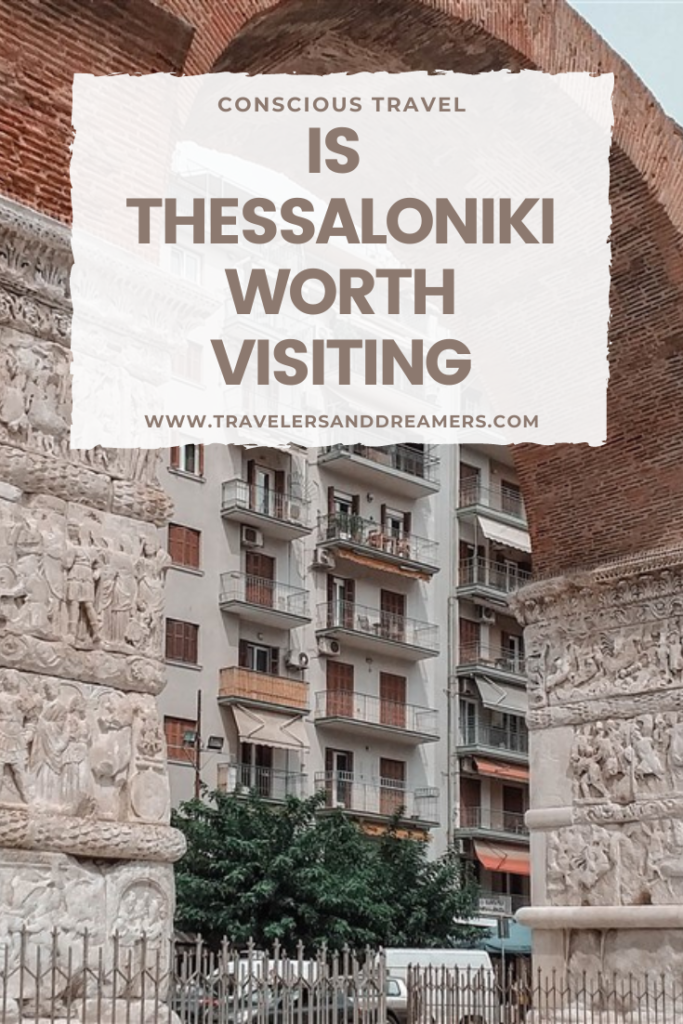


Hi! I am Annelies and this is Travelers & Dreamers, a blog about conscious travel which means traveling in a more mindful way, with a positive impact on the world and yourself!
On this website, I cover different topics like slow travel, plant-based food guides, responsible travel, sustainable packing, eco-travel, and more!
Latest Posts

15 Best Things to Do in Nong Khiaw, Laos (2024)

Santa Rita, Salento: All You Need to Know
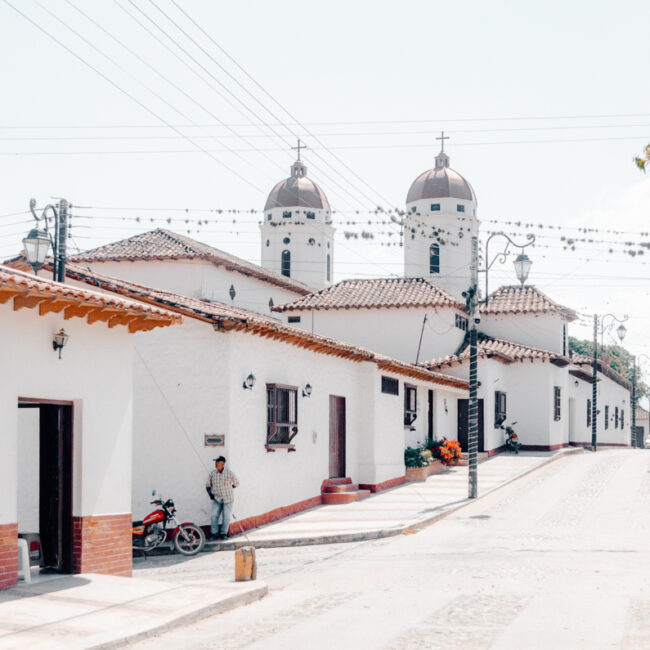
La Playa de Belen, Colombia: An Easy Travel guide!
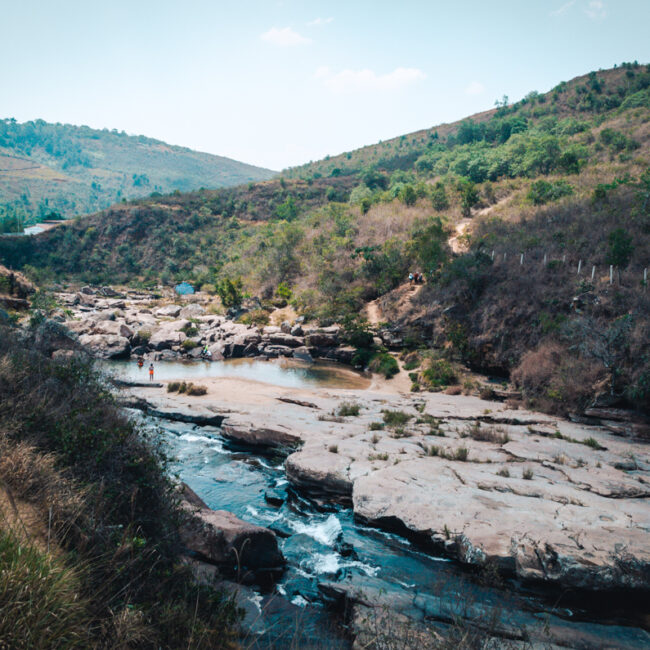
How to Visit the Pescaderito in Curiti (Near San Gil)
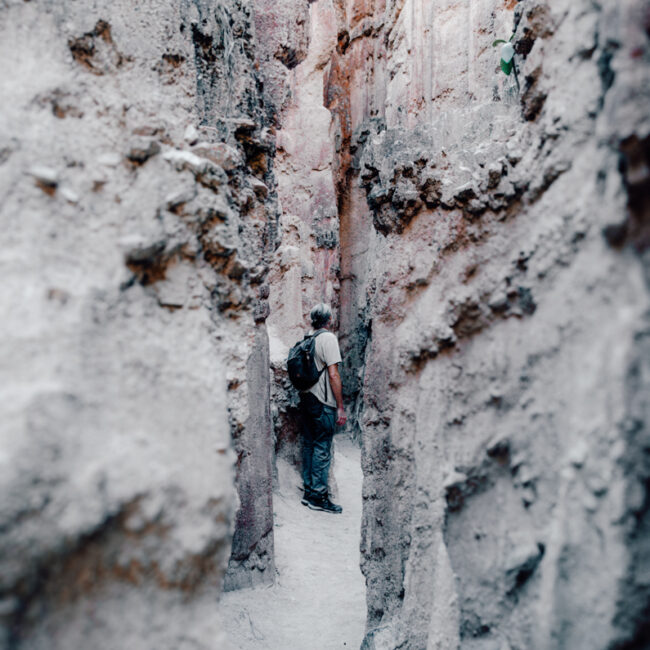
Los Estoraques Unique Natural Area: An Easy Travel Guide
Do you want to receive my latest finds on conscious and sustainable travel directly to your inbox? Subscribe here!
© COPYRIGHT TRAVELERS&DREAMERS, 2023.